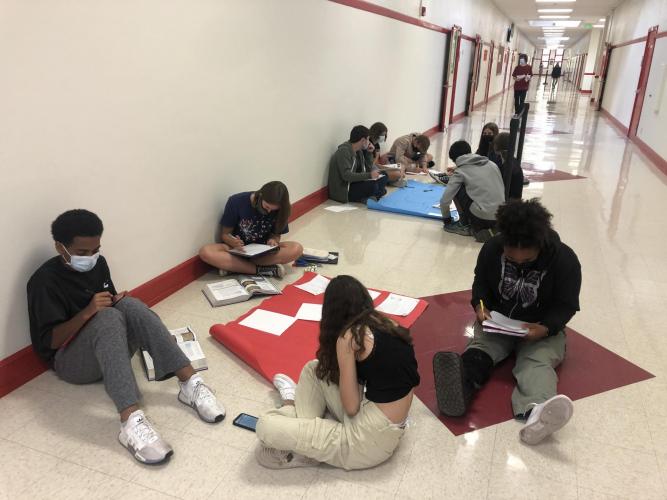Academics
Academics
To be in HISP means a student is placed in specific literature, composition, and social science courses that have been designed by HISP faculty and focus on the humanities and global perspectives. HISP students join students from CKM’s other small learning communities in their mathematics, science, language, physical education, and elective classes.
HISP is structured in a four-year sequence which includes a literature/ composition course, a complementary social science course, and a humanities or liberal arts elective each year. See the Course Sequence listed below for an outline of HISP class schedules by grade-level.
Students take a minimum of three years of foreign language. Over the four years, HISP students read at least 40 complete books in literature classes. In addition, students prepare during each summer for the coming school year by reading and responding in writing to fiction and non-fiction works chosen from specific lists relevant to their studies.
Freshman Year
During the freshman year, students explore the history and literature of Western civilization and its influence on the 20th century. The freshman year lays a strong foundation of Western history and philosophy that prepares students for their sophomore year when they expand their world view to encompass the cultural richness of all nations and all continents.
Sophomore Year
The sophomore year curriculum includes four nine-week blocks on Africa, Latin America, the Middle East, and Asia. Special emphasis is placed on geography, comparative cultures, and religions; these are compared and contrasted with those of the West.
HISP sophomores take seven classes per semester instead of the regular six. The extra class is one semester of Ethnic Studies and one semester of Writer’s Workshop.
Junior and Senior Years
Junior coursework includes HISP U.S. History 11 and HISP American Literature 11—both honors courses. Senior courses are comprised of English 12 World Literature/Composition (AP), one semester of U.S. Government (AP), and a final semester of Comparative World Governments (AP), the culminating course for seniors which explores international relations through a variety of approaches including the Model United Nations.
Junior and senior courses are designed to complement each other in structure and content. Materials include classic and contemporary literature; students study complete texts which are often only excerpted in other college preparatory classes. Issues of local, national, and international concern are analyzed and discussed.
Course Descriptions
A primary goal of every HISP course is to expand a student’s understanding of peoples and their beliefs. Throughout their four years in HISP, students are exposed to a broad range of international literature, culture, and history.
Course Sequence
Over the four years of high school, each student will complete a sequence of courses. The grade-level sequences include HISP courses (literature/composition and social science); other CKM core subjects (mathematics and science); foreign languages; and electives. Below is a sample curriculum for all four years of high school.


